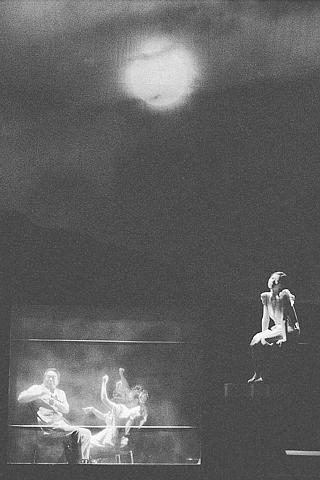Following the success of "A Midsummer-night's Dream" in July, the Godot Theatre Company (
"The first version was like a sketch, simple yet specific; the second an oil painting, rich in color and emotions," said director Liang Chi-ming (梁志民). "The third a water color painting simple and comfortable; and the fourth an old photo, cherishable and nostalgic."
Liang added that the fifth version is like a Chinese painting because of the picturesque stage background.

PHOTO: CHEN CHENG-CHANG, TAIPEI TIMES
The play made its debut in 1989, one year after the company was established.
"The main theme of the play is the relationship between people and the universe, how people should cherish what they have, and how to learn to cope with the life's difficulties and to coexist with the universe," Liang said.
The story is about everyday life in the pristine little town of Tamsui, and revolves around the life of one young man, Chen Shao-wei (
In the story, Chen and Ai were neighbors since childhood and later fall in love and get married.
One of the main characters is the "stage manager," played by singer Tsai Chin (
"I feel like a tour guide taking the audience across time and space," Tsai said.
"The audience might think it's just a show when they're watching it, but actually it may end up being part of their life when they go home, and that's my mission in this play."
Performing in a stage play is something different for Tsai, who has spent the past few years participating in musicals.
"Compared to my last performance [the musical, "The Angel Never Sleeps," which debuted in November 1998], it's more difficult because I talk more than sing this time," she said.
"I feel like the membrane between the egg shell and the egg white because I'm the bridge between the audience and the cast."
There are few stage props, performers instead have to mime the actions of eating, washing, and writing.
The music was composed and is played by Hong Kong composer Chris Babida (
Babida has written 10 new accompaniments for the play and recomposed six songs adopted from famous old Chinese songs. He also improvises certain music on the spot when he "feels things are right," he said.
The performance will continue in Taipei through Dec. 31, and is slated to travel to Taichung, Kaohsiung, Keelung, and Hsinchu.
Part of the proceeds from the show will go to Tzu Chi Foundation's 921 earthquake reconstruction fund. For more information, call the company at 2593-5070.

MORE VISITORS: The Tourism Administration said that it is seeing positive prospects in its efforts to expand the tourism market in North America and Europe Taiwan has been ranked as the cheapest place in the world to travel to this year, based on a list recommended by NerdWallet. The San Francisco-based personal finance company said that Taiwan topped the list of 16 nations it chose for budget travelers because US tourists do not need visas and travelers can easily have a good meal for less than US$10. A bus ride in Taipei costs just under US$0.50, while subway rides start at US$0.60, the firm said, adding that public transportation in Taiwan is easy to navigate. The firm also called Taiwan a “food lover’s paradise,” citing inexpensive breakfast stalls

TRADE: A mandatory declaration of origin for manufactured goods bound for the US is to take effect on May 7 to block China from exploiting Taiwan’s trade channels All products manufactured in Taiwan and exported to the US must include a signed declaration of origin starting on May 7, the Bureau of Foreign Trade announced yesterday. US President Donald Trump on April 2 imposed a 32 percent tariff on imports from Taiwan, but one week later announced a 90-day pause on its implementation. However, a universal 10 percent tariff was immediately applied to most imports from around the world. On April 12, the Trump administration further exempted computers, smartphones and semiconductors from the new tariffs. In response, President William Lai’s (賴清德) administration has introduced a series of countermeasures to support affected

CROSS-STRAIT: The vast majority of Taiwanese support maintaining the ‘status quo,’ while concern is rising about Beijing’s influence operations More than eight out of 10 Taiwanese reject Beijing’s “one country, two systems” framework for cross-strait relations, according to a survey released by the Mainland Affairs Council (MAC) on Thursday. The MAC’s latest quarterly survey found that 84.4 percent of respondents opposed Beijing’s “one country, two systems” formula for handling cross-strait relations — a figure consistent with past polling. Over the past three years, opposition to the framework has remained high, ranging from a low of 83.6 percent in April 2023 to a peak of 89.6 percent in April last year. In the most recent poll, 82.5 percent also rejected China’s

PLUGGING HOLES: The amendments would bring the legislation in line with systems found in other countries such as Japan and the US, Legislator Chen Kuan-ting said Democratic Progressive Party (DPP) Legislator Chen Kuan-ting (陳冠廷) has proposed amending national security legislation amid a spate of espionage cases. Potential gaps in security vetting procedures for personnel with access to sensitive information prompted him to propose the amendments, which would introduce changes to Article 14 of the Classified National Security Information Protection Act (國家機密保護法), Chen said yesterday. The proposal, which aims to enhance interagency vetting procedures and reduce the risk of classified information leaks, would establish a comprehensive security clearance system in Taiwan, he said. The amendment would require character and loyalty checks for civil servants and intelligence personnel prior to